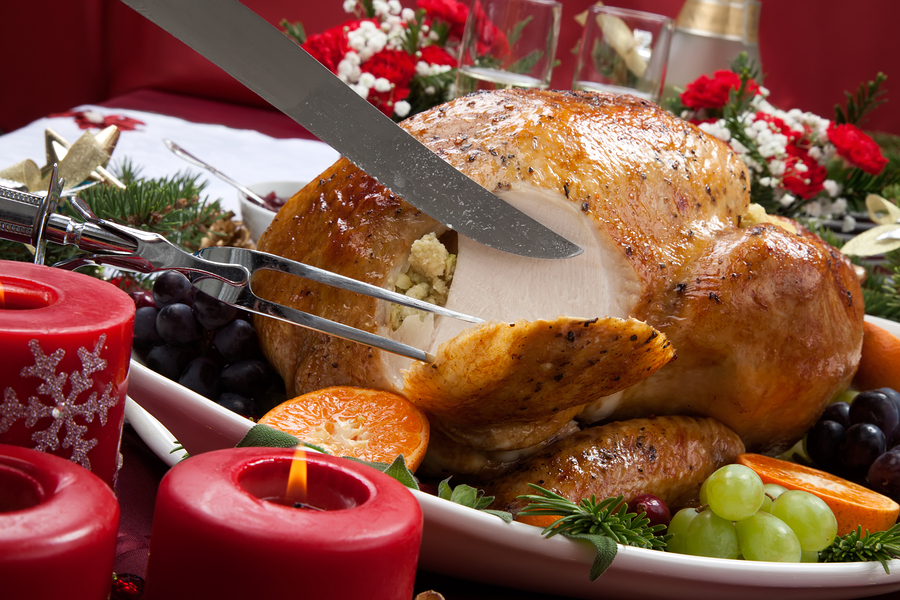- Make It Yourself Lavender Heart-Shaped Bath Bombs!
- 20 Things You Never Knew About “Down There”
- 12 Best Foods For Those Suffering From Arthritis Pain
- 12 Personal Hygiene Mistakes Almost Everyone Makes (Mom Never Told You About #4!)
- 15 Medicinal Plants And Herbs From The Cherokee People
- 12 Mind-Blowing Benefits Of Drinking Coconut Water During Pregnancy
- 12 Outstanding Winter Foods That Won’t Fatten You Up Like A Christmas Turkey
Turkey Safety Tips For The Holidays

Photo credit: bigstock.com
Everyone looks forward to huge, delicious meals during the holiday season. Blazing pudding, sweet potatoes, stuffing, pies, and big, juicy turkeys are as enticing as any gifts that may appear under the Christmas tree. But with so many ingredients, there are a lot of different steps in the meal preparation process where something can go wrong. Nothing puts a damper on a Christmas dinner like food poisoning. Luckily, by following some simple precautions, you can protect yourself and your loved ones this holiday season and ensure happy (and tasty) memories for everyone attending.
1. Poultry safety
Let’s talk turkey. These are large birds with a lot of meat on their bones, making them by far the most popular poultry choice for many holiday meals. It is important, however, to follower proper precautions when preparing them, because this is where most cases of food poisoning in holiday meals originate.
2. Is the turkey fresh or frozen?
If it’s the former, you can skip ahead, but if you’re dealing with a frozen turkey, there are some specific steps you need to follow. Many people opt for a frozen turkey for convenience, and it certainly does offer this, since you have the option of saving it for a long time. However, this can quickly become an inconvenience if you do not give yourself enough time to thaw the turkey.
A large frozen turkey can take nearly 48 hours to fully thaw, so plan in advance when to take it out of the freezer to make sure it will be ready to cook in time. It is also very important that you thaw it in the proper way. Remove the turkey from the freezer and allow it to thaw in the refrigerator. Allow around 10 to 12 hours per kilogram (roughly 5 to 5 and three-quarters hours per pound) for the bird to thaw inside a refrigerator set to 39 degrees Fahrenheit (4 degrees Celsius). In a cool room, defined as below 64 degrees Fahrenheit (17.5 degrees Celsius), allow 3 to 4 hours per kilogram. At room temperature, or 68 degrees Fahrenheit (20 degrees Celsius), plan for around 2 hours per kilogram.
Continue to Page 2

Photo credit: bigstock.com
3. Don’t rinse that bird
Once the turkey is thawed, it’s ready to cook. DO NOT WASH IT IN THE SINK. This is a very common mistake, and rather than preventing food poisoning, it actually increases the risk, because the water that invariably splashes off the raw turkey on the counter can spread germs. If the turkey has e. coli or salmonella on it, those germs have now contaminated the countertops and other surfaces nearby. If you cook your turkey at the proper temperature, it will kill any harmful germs.
4. Cook your turkey properly
The conventional oven is the most popular way to prepare a turkey. Make sure you have your oven set to the correct heat and that it is cooked thoroughly. Preheat the oven to 325 degrees Fahrenheit (163 degrees Celsius). The actual cooking time will vary depending on how big the turkey is and whether or not it is stuffed. The most important thing to keep track of is the internal temperature, because this is what determines if the turkey is safe to eat. The internal temperature should be at least 165 degrees Fahrenheit/74 degrees Celsius. Use a meat thermometer to check the temperature in the breast, and in the thickest, innermost part of the bird between the thigh and the wing.
Don’t let the leftovers sit out too long. Try not to leave the food sitting out for more than 2 hours. There is a “Goldilocks zone” for bacterial growth within food—between 40 and 140 degrees Fahrenheit (4.44 to 60 degrees Celsius). The longer food sits out on the counter, the more likely it is to fall within that temperature range. Simply packing it up after an hour or two is an easy way to avoid this problem.
READ ALSO: 10 Effective Strategies For Staying Healthy During The Holidays Video
Follow these simple steps to make sure that you have a safe and delicious holiday meal that is full of cheer and free of food-borne illness. Enjoy and have a wonderful holiday season!
References:
































